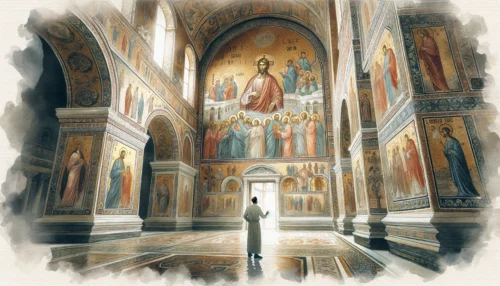The church, an integral part of the Christian faith, serves a multifaceted purpose that extends beyond the weekly gatherings for worship. It is a vessel through which God’s love, teachings, and salvation are communicated to humanity. The church is also a place of community, where believers come together to encourage, support, and grow with each other. Understanding the purpose of the church is fundamental to our spiritual growth and our journey as followers of Christ.
The Church as the Body of Christ
The concept of the church as the Body of Christ is a powerful metaphor that paints a vivid picture of the interconnectedness and unity among believers. This idea, which finds its roots in the New Testament (1 Corinthians 12:12-27), suggests that just as a body is made up of many parts working together, so is the church.
Each member of the church, like the different parts of a body, has unique roles and responsibilities. Some are called to lead, others to teach, and others to offer support in various ways. Each role is equally important, and the church cannot function optimally if a part is missing or neglected.
This metaphor also underscores the importance of unity within the church. Each part of the body must work in harmony with the others for the body to function properly. The same holds true for the church: we must strive to live in harmony, celebrating our differences, respecting our diversity, and loving one another as Christ loved us (John 13:34-35).
Being the Body of Christ also means that the church is Christ’s representation on earth. As members of this body, we are called to live and act in ways that reflect Christ to the world. We are His hands, reaching out to those in need; His feet, going to places where His love is needed; and His voice, speaking words of comfort, hope, and truth.
The idea of the church being the Body of Christ is not just a nice metaphor, but a profound truth that has practical implications for how we live out our faith. As part of this body, each of us has a vital role to play in demonstrating God’s love to the world, in teaching His truth, and in supporting and encouraging our fellow believers.
The church, as the Body of Christ, represents an intricate network of believers unified in purpose and function. Each member, with their unique roles and responsibilities, contributes to the collective work of the church. This interconnectedness fosters harmony and mutual respect, emulating the love Christ has for us. As the Body of Christ, the church serves as His tangible representation on earth, reflecting His teachings and love to the world.
The Church as a Beacon of God’s Love
The church is not merely a structure of bricks and mortar; it is a living, breathing entity that exists to radiate God’s love to the world. This love is not a vague concept but an active, transformative force that impacts lives and communities. The New Testament teaches us that God is love, and those who live in love live in God, and God in them (1 John 4:16).
Living out this divine love is a core mission of the church. This love is manifested in several ways, such as acts of kindness, forgiveness, compassion, and support for those in need. The church is tasked with showing God’s love to the world, extending it to all people, regardless of who they are or where they come from. We are called to love our neighbors as ourselves (Mark 12:31).
The church also serves as a conduit of God’s love by teaching about His love and demonstrating it. Through various ministries and outreach programs, the church makes an effort to reach out to the less fortunate, the marginalized, and those in need of spiritual nourishment. The story of the Good Samaritan (Luke 10:25-37) serves as a timeless reminder of our call to express God’s love in tangible ways.
The church, by embodying God’s love, also offers a sense of hope and solace to those who are broken and hurting. It is a place where people can experience God’s love in a tangible way, and in turn, are inspired to share this love with others.
The church stands as a beacon of God’s love, expressing it through acts of kindness, forgiveness, and support for those in need. It’s tasked with teaching about and demonstrating God’s love to all, reflecting the divine principle of loving our neighbors. Through ministries and outreach programs, the church reaches out to people from all walks of life, particularly the marginalized and less fortunate. In doing so, it provides a sense of hope and solace, allowing people to experience God’s love in tangible ways.
The Church as a Place of Spiritual Growth and Fellowship
A significant purpose of the church is to serve as a nurturing ground for spiritual growth and fellowship. It’s a place where believers gather to learn about God, deepen their understanding of His teachings, and grow in their faith. The New Testament speaks of the early believers who devoted themselves to the apostles’ teachings and to fellowship (Acts 2:42).
A key element of this growth is the teaching and studying of God’s word. This learning happens in a variety of settings within the church, from formal sermons during services to Bible study groups and Sunday school classes. The goal is to help believers understand God’s teachings better, apply them in their lives, and grow closer to Him.
But spiritual growth is not a solitary process. It happens in community, with believers supporting and encouraging each other. The church provides a space for this communal growth, promoting fellowship among believers. This fellowship is not just about socializing; it’s about sharing life together, praying for one another, and helping each other in times of need (Galatians 6:2).
The church also equips believers for service, helping them discover their spiritual gifts and how to use them for God’s glory (Romans 12:6-8). By serving in various church ministries and in the wider community, believers can grow in their faith and make a positive impact on the world around them.
The church serves as a fertile ground for spiritual growth and fellowship, offering believers a space to learn about God, deepen their faith, and support each other. It places a strong emphasis on teaching God’s word and applying it in daily life. The communal aspect of the church allows believers to share life, pray together, and assist each other in times of need. Furthermore, the church nurtures believers to discover and utilize their spiritual gifts in service, fostering personal growth and community impact.
Reflecting on the Church’s Divine Purpose
Having navigated through the multifaceted purpose of the church, we see it as a mirror reflecting God’s design. It stands as the Body of Christ, radiates His love as a beacon, and provides a nurturing ground for spiritual growth and fellowship.
Here are a few questions to prompt further reflection on the topic:
- How can I contribute to the church as a part of the Body of Christ?
- What are some tangible ways I can express God’s love within my church community?
- In what areas of my life can the church help me grow spiritually?
The church, in its divine purpose, extends an invitation for us to be part of something bigger than ourselves. It invites us to participate in a grand, divine narrative, one where we learn, grow, serve, and most importantly, love like Christ. As we journey together in this walk of faith, may we find our place in the church, using our unique gifts to glorify God and make His love known. May the church continue to be a living testimony of God’s love, a vibrant community of believers, and a nurturing space for spiritual growth. With every step we take, let us echo the heart of Christ, for we are His church.














